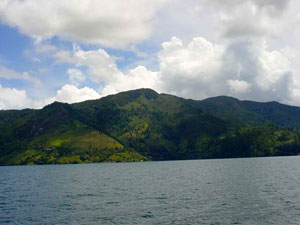A likely candidate for this near annihilation event is the Toba volcanic eruption that happened in Indonesia 75,000 or so years ago. This eruption was huge.
It was equivalent to around 1 billion tons of dynamite and was about 3000 times more powerful than the Mount Saint Helens eruption in 1980. It also may have reduced the average global temperature by 5 degrees Celsius, darkened the world for 5 or 6 years, and plunged the world into a new Ice Age.
As you might imagine, this eruption had dramatic effects on species around the world including our own. Estimates of how many people were left range from around 1000-10,000 breeding pairs. The theory is that we are all so alike because we share these survivors' DNA.
Whether true or not, a bottleneck in our past would not make us unique. Lots of species go through these near death experiences.
Scientists think cheetahs went through one around 10,000 years ago. Cheetahs are all so similar genetically that veterinarians can do skin grafts with "unrelated" cheetahs.
And of course, people have created bottlenecks in species too. For example, in the late 1890's there may have only been 20-100 elephant seals left in the world because of hunting. Now there are at least 150,000 spread across the west coast.
Species are in danger long after they go through a bottleneck. They have a pretty limited gene pool which means they may not be particularly healthy and are in danger of being wiped out by, for example, a single disease. Humans are probably OK in this regard (consider natural resistance to HIV for example) but elephant seals, bison, and cheetahs, and many other species may not be.
Fortunately for us we successfully came through our bottleneck. Hopefully, the animals that we've nearly wiped out will too.
 Dr. Barry Starr is a Geneticist-in-Residence at The Tech Museum of Innovation in San Jose, CA.
Dr. Barry Starr is a Geneticist-in-Residence at The Tech Museum of Innovation in San Jose, CA.

